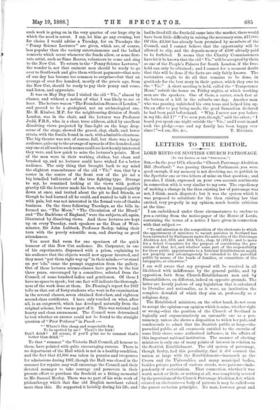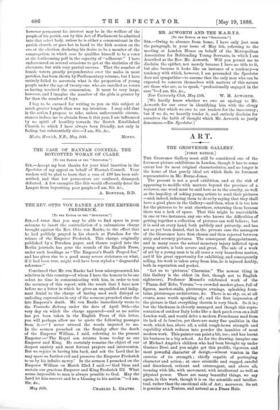LETTERS TO THE EDITOR.
LORD MINTO ON SCOTTISH CHTJRCH PATRONAGE. rro THE EDITOR OF THE " SPECTATOR:1 Sr,—In the year 1874, when the" Church Patronage Abolition Bill (Scotland) " was passing through Parliament, you were good enough, if my memory is not deceiving me, to publish in the Spectator one or two letters of mine on that question ; and you also, I think, expressed on your own account sentiments
in connection with it very similar to my own. The expediency of making a change in the then existing law of patronage was not, I think, much disputed ; but it was the system which it was proposed to substitute for the then existing law that excited, very properly in my opinion, much hostile criticism at the time.
I am emboldened under these circumstances to enclose to you a cutting from the notice-paper of the House of Lords, containing the terms of a notice I have given in connection with that subject :—
"To call attention to the composition of the electorate to which the appointment of ministers to vacant parishes in Scotland has been entrusted by Parliament under the authority of the Patronage Abolition Act, 37th and 38th Vict., chap. 82 (1874) ; and to move for a Select Committee for the purpose of considering the pro- visions of that Act, and whether some part of the responsibility for these public appointments to a National Establishment might not properly and advantageously be extended to the parochial public by means of the heads of families, or committees of the ratepayers, or otherwise."
I am well aware that my proposal will be received in all likelihood with indifference by the general public, and by opposition both from Church-Establishment men and by
Disestablishers, on different, indeed on opposite grounds. The latter are keenly jealous of any legislation that is calculated to liberalise and nationalise, as it were, an institution the complete downfall of which they aim at, professedly as a religious duty.
The Established ministers, on the other hand, do not seem to accept the opinion—an opinion which is mine, whether right
or wrong—that the position of the Church of Scotland is logically and argumentatively an untenable one as a per- manency, unless she shows a disposition to widen her pale, and condescends to admit that the Scottish public at large—the parochial public, at all events—is entitled to the exercise of some little share, some authorised influence, in the affairs of
this important national institution. The manner of electing ministers is only one of many points of interest in relation to the Scottish Establishment. The old system of patronage, though faulty, had this peculiarity, that it did connect the
nation at large with the Establishment---inasmuch as the
Crown and the Universities, and many municipal bodies, besides private parties of various creeds, were patrons—inde- pendently of sectarianism. That connection, whether it was
worth much or little, or nothing at all, was completely severed by the provisions of the Church Patronage Abolition Act, which created an electorate—a body of patrons it may be called—on the purest sectarian principles. No man, however great and however permanent his interest may be in the welfare of the people of his parish, can by this Act of Parliament be admitted into that select body, unless he is either a communicant in the parish church, or goes hat in hand to the kirk session on the eve of the election, declaring his desire to be a member of the congregation, in which case he qualifies himself to be a voter at the forthcoming poll in the capacity of "adherent." I have endeavoured on several occasions to get at the statistics of the electorate, but with very partial success. That the number of female voters greatly preponderates over the males in most parishes, has been shown by Parliamentary returns; but I have entirely failed to ascertain what is the proportion of young people under the age of twenty-one who are enrolled as voters as having received the communion. It must be very large, however, and I imagine the number of the girls is greater by far than the number of boys.
I beg to be excused for writing to you on this subject at much greater length than was my intention. I may add that in the action I propose to take, unless unfavourable circum- stances induce me to abstain from it this year, I am influenced by no spirit of hostility towards the Scotch Established Church, to which I have always been friendly, not only in feeling, but substantially also.—I am, Sir, &c., Minto, Haivick, N.B., May 16th. MINT°.



































 Previous page
Previous page